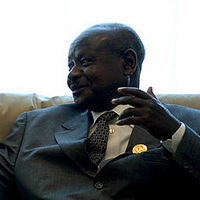KAMPALA, Uganda -- Ranging over hills that slope gracefully down into Lake Victoria, Kampala is arguably one of the more beautiful capitals in Africa. But the city's beauty not only belies the numbing poverty in which most of Uganda's residents find themselves, it also masks the country's ugly politics. Case in point: The outcome of Uganda's 2011 presidential election is a foregone conclusion, and no one -- whether Uganda's electoral commission, its legions of international donors, or the investors in its newly discovered oil fields -- is likely to do anything about it.
President Yoweri Museveni rose to power in 1986 as the head of the guerrilla National Resistance Army that overpowered the regime of Milton Obote. In the intervening years, he earned the favor and financial support of international donors for his commitment to IMF-imposed financial regimes that paid off in infrastructure dividends.
That fiscal discipline seemed to overshadow some of Museveni's more questionable tactical and security decisions, including Uganda's role in the mid-1990s civil war in Democratic Republic of Congo. Even his scorched-earth campaign against the northern rebel Lord's Resistance Army -- which led to the internment of the ethnic Acholi people in squalid camps as a way to "save" them from conscription in the LRA -- unfolded with relatively little scrutiny.

